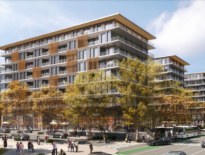If state infrastructure grants and moral duty aren’t enough to sway residents and officials in Newton and Arlington to pull their weight in solving the state’s housing crisis, could the climate emergency help?
That’s the hope of some scholars and legislators after state Senate and House negotiators unveiled the compromise version of the latest piece of major climate change legislation last week. The bill’s main focus is dramatically ramping up the production of clean energy via offshore wind, but it includes a “demonstration program” that lets 10 towns and cities require new development ditch natural gas-powered building systems in favor of heat pumps, induction cooktops and other electrically powered devices.
Unlike previous versions of this idea, it exempts lab construction – a praiseworthy and technically necessary move given the asset type’s enormous energy needs – and it also makes any town that wants to participate either have met Chapter 40B’s requirements to create or plan for affordable housing or zone an area of “reasonable size” for multifamily units at a density comparable to a neighborhood of three-deckers.
Of the communities that were already raring to take advantage of such a pilot program, only Newton and Arlington don’t meet the criteria. Embracing density – perhaps the most climate-friendly development policy any town can have, as it lets residents walk or cycle to most destinations, instead of drive – has been a struggle in both communities, with some officials musing they should flout the new MBTA Communities zoning reforms.
With the measure now on Gov. Charlie Baker’s desk, three questions should influence his decision.
First, are there enough multifamily projects in process that would have to redesign their HVAC systems to comply with a sudden natural gas ban to hobble construction in likely communities? The administration’s own data reported as part of the Stretch Energy Code development shows that many types of construction, including small multifamilies, can be cheaper to build and operate if designed to be all-electric from the start. But change orders are expensive, especially with construction costs soaring and lenders becoming far more reluctant to invest in developments.
Second, are the housing production requirements enough? Legislators allowed communities that have a housing production plan approved but not certified by state officials to participate – a lower standard than housing production plan certification that doesn’t require towns and cities to be making progress towards production goals.
Third, does the need for a demonstration program to gather data and prove out the best ways to go all-electric in communities where existing high prices could cover the risk of higher construction costs outweigh the downsides? The development industry is by nature conservative and not a few of its members will need to see private-sector examples of all-electric construction to transform the products they produce.
Legislators made a good effort to respond to concerns about a prior bill. If this version isn’t sufficient, another attempt at a pilot program will be needed next session.
Letters to the editor of 350 words or less may be submitted via email at editorial@thewarrengroup.com with the subject line “Letter to the Editor,” or mailed to the offices of The Warren Group. Submission is not a guarantee of publication.






